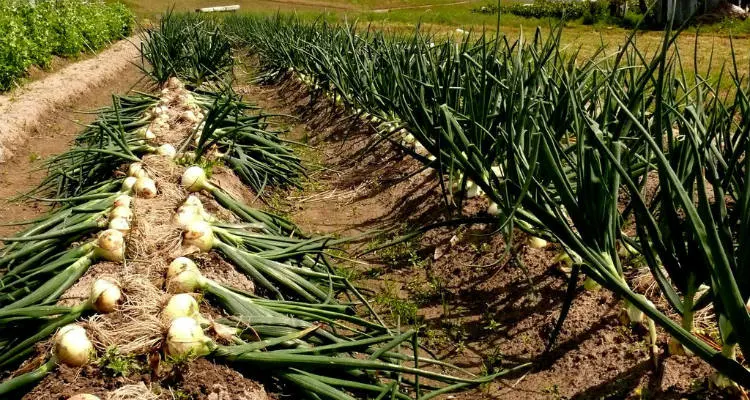
In the realm of onion cultivation, the choice of fertilizer holds paramount importance, dictating the success or failure of the harvest. The journey to uncover the most effective best fertilizer for onions traverses through a terrain of nutrient composition, growth stage nuances, and adept application methodologies. For farmers poised on the brink of onion cultivation or seeking to refine their existing practices, this exploration serves as a beacon, illuminating the path towards bountiful yields and sustenance of crop vitality.
Key Nutrient Composition for Optimal Onion Growth
The journey of an onion seedling towards maturity is fueled by a delicate interplay of essential nutrients. Nitrogen, phosphorus, and potassium stand as the triad of vitality, each bearing distinct responsibilities in nurturing the onion plant to fruition. Nitrogen, the herald of verdant splendor, orchestrates the synthesis of robust foliage, casting a verdant cloak over the burgeoning crop. Phosphorus, the silent architect beneath the soil, constructs a labyrinth of intricate root systems, laying the foundation for bulbous prosperity. Potassium, the sentinel of resilience, fortifies the plant’s defenses against the onslaught of maladies, fostering an environment conducive to unhindered growth. Thus, a fertilizer enriched with the harmonious convergence of these elemental forces becomes the elixir that propels onion cultivation towards zeniths of success.
Fertilizer Recommendations Across Growth Phases

The odyssey of onion growth unfolds across a symphony of stages, each demanding bespoke nourishment to orchestrate nature’s grandeur. During the nascent phase of germination and root establishment, phosphorus emerges as the guiding light, sculpting the subterranean realm with its nurturing embrace. Fertilizers bearing a preponderance of phosphorus furnish the fledgling onion with the sustenance necessary to anchor itself firmly within the earth’s embrace, laying the groundwork for future ascendance. As the plant embarks upon its vegetative sojourn, nitrogen assumes the mantle of prominence, heralding a verdant resurgence across the verdant expanse. Nitrogen-rich fertilizers, administered with judicious care, stimulate the proliferation of lush foliage, ushering forth a spectacle of greenery that serves as the crucible for bulb development. Finally, as the crescendo of growth approaches its zenith, potassium emerges as the custodian of resilience, infusing the plant with the fortitude to withstand the rigors of nature’s caprice. Fertilizers imbued with potassium impart an armor of protection, fortifying the onion against the onslaught of pests, diseases, and environmental adversities, thereby ensuring the preservation of its vigor and vitality.
Exploring Soil pH and Macronutrient Uptake

The soil’s pH level plays a pivotal role in nutrient availability to onion plants. Understanding the ideal pH range for onions (typically between 6.0 and 7.5) is essential for optimal macronutrient uptake. Fertilizers formulated to adjust soil pH and promote nutrient absorption can significantly enhance onion growth and development.
Microbial Inoculants and Soil Health
Harnessing the power of beneficial microbes through microbial inoculants can foster a symbiotic relationship between soil microorganisms and onion plants. These inoculants bolster soil health, improve nutrient cycling, and enhance plant resilience against pathogens. Integrating microbial inoculants into fertilizer regimes can contribute to sustainable onion cultivation practices.
Organic vs. Synthetic Fertilizers
The choice between organic and synthetic fertilizers is a critical consideration for onion farmers. Organic fertilizers, derived from natural sources, offer slow-release nutrients and promote soil biodiversity. Conversely, synthetic fertilizers provide readily available nutrients but may contribute to environmental degradation if misused. Evaluating the pros and cons of each fertilizer type helps farmers make informed decisions aligned with their sustainability goals.
Fertilizer Application Timing and Frequency
Fine-tuning the timing and frequency of fertilizer application is crucial for optimizing nutrient uptake and minimizing environmental impact. Splitting fertilizer applications into multiple doses throughout the growing season ensures a steady supply of nutrients tailored to the onion plant’s changing needs. Additionally, synchronizing fertilizer applications with irrigation schedules can enhance nutrient efficiency and minimize nutrient leaching.
Integrated Nutrient Management Strategies
Adopting integrated nutrient management (INM) strategies involves combining organic amendments, cover crops, and mineral fertilizers to optimize nutrient availability and utilization. INM fosters soil fertility, reduces dependency on external inputs, and promotes long-term sustainability in onion cultivation. Implementing INM practices empowers farmers to achieve holistic nutrient management and mitigate environmental risks associated with excessive fertilizer use.
In the world of onion farming, selecting the right fertilizer is paramount to achieving abundant harvests, quality produce, and sustainable crop growth. From this in-depth exploration, it’s evident that the keyword “best fertilizer for onions” encompasses a multifaceted journey encompassing the nuances of nutrient composition, tailored fertilizer selection based on growth stages, and effective application techniques.
Fertilizers with a balanced nutrient composition, tailored to the onion plant’s growth stages, and applied correctly, can provide optimal support for onion growth and yields. Additionally, understanding soil pH regulation, the benefits of microbial inoculants, and the considerations between organic and synthetic fertilizers also play crucial roles in maintaining environmental sustainability and soil health.
By applying this knowledge, onion farmers can optimize their farming practices, enhance harvest yields, and ensure the long-term sustainability of onion crop growth. Thus, wise fertilizer selection and integrated nutrient management will remain key to success in onion cultivation in the future.